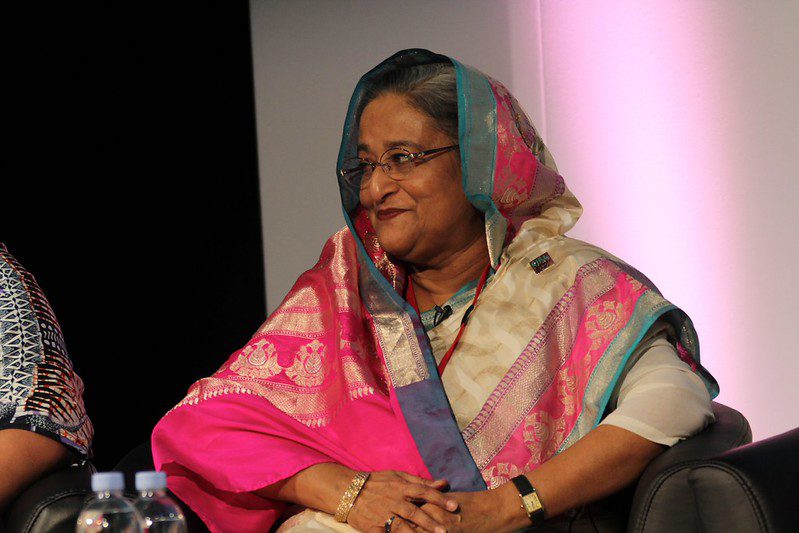In a judicial decision, Bangladesh’s ousted ruler, Sheikh Hasina, has been sentenced to death, convicted of orchestrating a brutal, lethal response to a massive, student-led popular uprising. The uprising has fractured Bangladesh’s political system and sent ramifications across the world, inspiring other similar movements in Nepal and Madagascar. The verdict, delivered by the International Crimes Tribunal (ICT) on Monday, November 17, 2025, effectively seals the political fate of the former Prime Minister, who governed the nation for 15 tumultuous years.
Hasina has been living in exile in India since fleeing the chaos in August 2024, the 78-year-old was found guilty of ordering security forces to employ deadly force against anti-government demonstrators. The crackdown, which crushed months of widespread civil unrest, is believed to have claimed the lives of hundreds, if not thousands, of citizens. The United Nations has indicated that up to 1,400 people may have been killed during the military and police clampdown, an event now tragically known as the “July Massacre.”
The Spark: From Quota Reform to Mass Uprising
The chain of events that culminated in Hasina’s ouster and death sentence was initially triggered by a seemingly narrow, albeit highly contentious, issue: the government job quota system.

Image: Former Bangladeshi Prime Minister Sheikh Hasina in India – Indian Ministry of Foreign Affairs
The protests, spearheaded by university students under the banner of the Anti-discrimination Students Movement, began in response to a High Court ruling in June 2024. The court effectively reinstated an archaic quota system that reserved a significant portion of government jobs: most notably 30% for the descendants of independence war fighters.
- Initial Grievance: For years,students argued this system unfairly limited opportunities for a large, educated youth population seeking civil service jobs on the basis of merit. They viewed the quota as a mechanism to reward and cement the loyalty of Awami League supporters.
- Rapid Escalation: While the protests started peacefully, the situation spiraled out of control after clashes with police and activists from the ruling Awami League’s student wing, the Chhatra League. Tensions were further inflamed when Hasina allegedly labelled the protesters “razakars”, a deeply provocative and offensive term used for collaborators of the Pakistani forces during the 1971 liberation war.
- A Deeper Well of Discontent: The quota issue became the flashpoint for a much deeper well of public anger. Years of accumulated grievances over high youth unemployment, soaring inflation, and rampant corruption allegations against Hasina’s increasingly authoritarian government quickly transformed the student movement into a full-fledged mass uprising demanding her immediate resignation.
When the government responded with massive, state-led violence, imposing curfews, cutting the internet, and authorising the use of lethal weapons, the political goal of the movement shifted entirely from mere quota reform to demanding accountability for the bloodshed and the immediate downfall of her regime.
Command Responsibility and Capital Punishment
The Dhaka-based ICT, a domestic court initially set up to try war crimes, conducted the proceedings in absentia. Following a trial lasting several months, Hasina received a life sentence for general crimes against humanity and the ultimate penalty, death, for the specific murders of multiple individuals during the widespread protests. The charges detailed her role in directing security operations where police and paramilitary forces allegedly used shotguns at close range and heavy-handed tactics for “maximum harm.”
A key piece of evidence presented by the prosecution involved recorded conversations in which Hasina purportedly directed security officers to deploy aggressive measures, including the suggestion of dropping bombs from helicopters onto protesting crowds. While her son and supporters claimed the clip was selectively edited and taken out of context, insisting she was only ordering the arrest of violent elements, the court deemed the evidence sufficient for conviction.
“Kangaroo Court”: Defence of the Accused
Sheikh Hasina immediately rejected the verdict, branding the tribunal a “kangaroo court” and the entire process as “biased and politically motivated.” She maintained her innocence, stating unequivocally: “I wholly deny the accusations that have been made against me in the ICT… But neither I nor other political leaders ordered the killing of protesters.”
Diplomatic Pressure and Domestic Turmoil
The dramatic sentencing has ignited a diplomatic flare-up with neighbouring India, where Hasina and her former home minister, Asaduzzaman Khan (also sentenced to death), are currently residing. Bangladesh’s foreign ministry has formally demanded that New Delhi hand over the two political fugitives, citing an existing extradition treaty.

Image: Former Bangladeshi PM Sheikh Hasina – Russell Watkins/Department for International Development
India, a historically close ally of Hasina’s regime, has reacted cautiously, merely stating it has “noted” the verdict and will “engage constructively with all stakeholders.” The decision on extradition is highly politically charged, as granting asylum could inflame relations with Bangladesh’s current interim government, while handing her over could be seen as abandoning a key regional partner.
Meanwhile, security has been drastically ramped up across Dhaka and other major cities. The moment the four-hour verdict was read, scenes of jubilation, including cheering and clapping, erupted in the packed courtroom. Outside, however, Hasina’s Awami League party swiftly called for a nationwide shutdown in a display of defiance, signaling that the removal of their leader from power has not extinguished the political tensions gripping the nation ahead of parliamentary elections slated for February.
Featured Image via Indian Ministry of External Affairs




